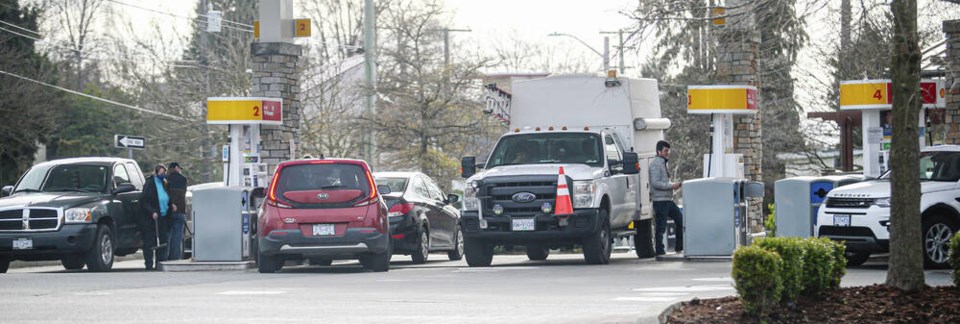Gas prices in Greater Victoria crossed the $2/litre mark on Monday, setting a new record high for the region.
Several capital region stations were selling regular gas at $2.089 a litre, while Sooke hit $2.169. But most appeared to still be at the previous record high of $1.949, set just last week.
Prior to the hike, gas was selling for $1.769 a litre at most stations in the capital region, after reaching $1.799 a litre in mid-February.
Drivers in Metro Vancouver also prices rise above $2 a litre over the weekend.
Despite the jump, B.C.’s minister of public safety said the province has no plans to follow Alberta’s lead to reduce its tax on gasoline to ease rising prices at the pumps.
Mike Farnworth told a news conference Monday that gas prices are driven by events outside of provincial control, such as the Russian invasion of Ukraine, which has upset energy markets around the world.
Alberta has responded by reducing its tax by 13 cents per litre on both gasoline and diesel.
Farnworth said there’s no simple solution to the rising fuel price situation. He said economists have noted that fuel companies don’t simply raise prices to take advantage of the margin.
“The reality is that there is significant instability in the energy markets on a global basis, directly related to the invasion of Ukraine by Russia,” Farnworth said.
Companies that buy or transport oil are reluctant to touch Russia’s output, fearing it will be subject to sanctions.
The effects are being felt here, event though Canada imports little petroleum from Russia. Most of the coastal B.C. supply comes from an oil refinery in Burnaby and ones in Edmonton and Washington state, which are largely unaffected.
Werner Antweiler, a business professor at the University of B.C. who specializes in international trade, gas prices and energy systems, said that because oil producers sell their products competitively on global markets, local prices are affected by worldwide events.
“We are at the mercy of international markets,” he said. “Crude oil is traded in monthly futures contracts and not in low-term contracts. If international prices are up, they will gain that benefit in all their markets.”
As a result of the supply-chain shortfall and increased taxation, Crown corporations have resorted to adding fees to cover fuel costs for their fleets. B.C. Ferries has implemented a one-per-cent fuel surcharge, adding 15 cents for adult passengers and 55 cents for a vehicle to the cost of sailings.
The hot prices are also expected to pass on the increased transportation and delivery costs of farming, agriculture and forestry products to consumers.
— With a file from the Vancouver Sun



